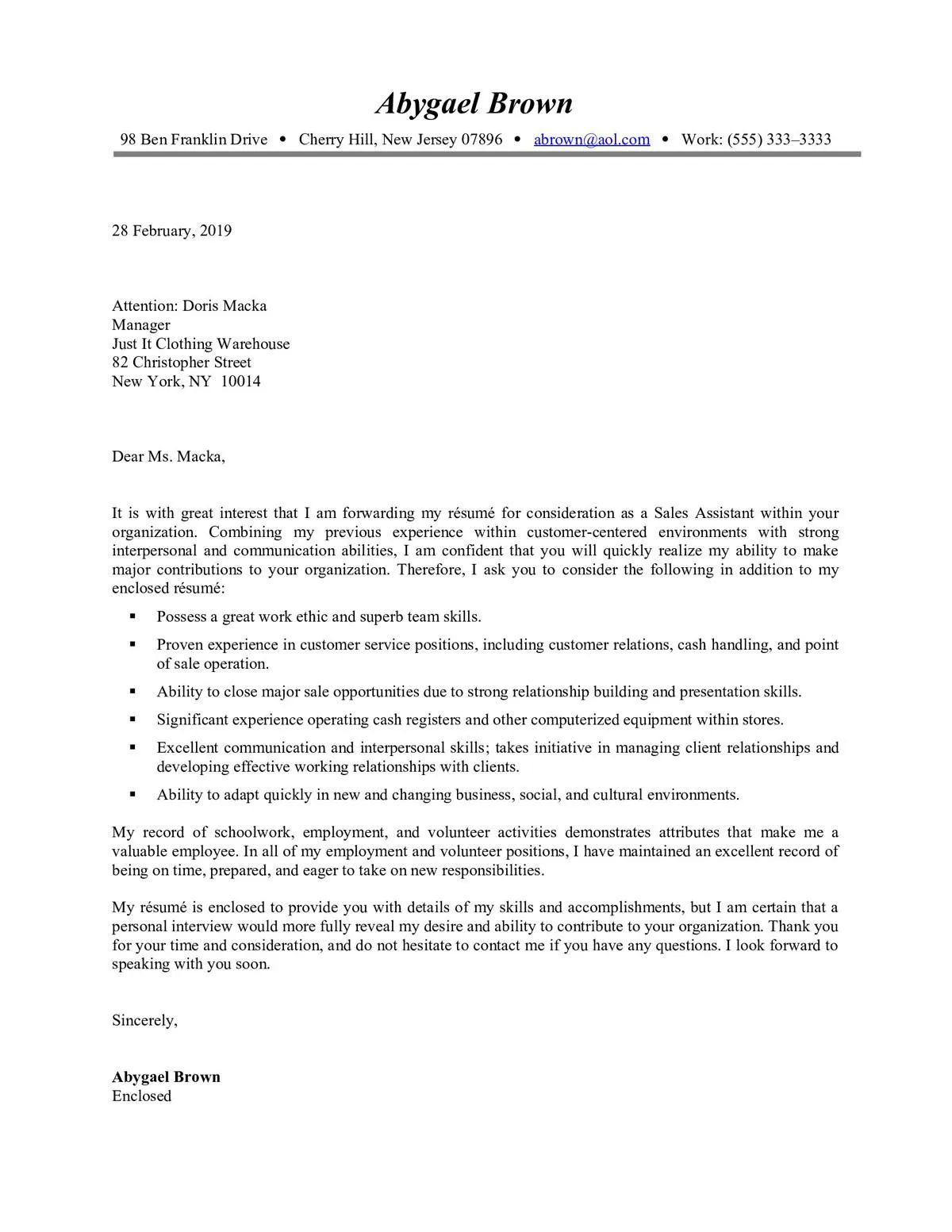Understanding the Importance of a Sales Cover Letter
In the competitive world of entry-level sales, a well-crafted cover letter is not just an optional extra, it is your first impression. It’s the initial handshake that introduces you to a potential employer, showcasing your personality, skills, and enthusiasm for the role. Unlike your resume, which provides a factual account of your experiences, your cover letter allows you to tell a story – your story – and explain why you are the perfect fit for the position. It’s your chance to differentiate yourself from other applicants and demonstrate your genuine interest in the company and the specific sales opportunity. A strong cover letter can significantly increase your chances of landing an interview, opening the door to a promising career in sales.
Key Elements of a Winning Entry-Level Sales Cover Letter
A winning entry-level sales cover letter consists of several key elements that work together to create a compelling narrative. These components include a professional header, a captivating introduction, well-structured body paragraphs that highlight your relevant skills and experiences, and a strong closing that reinforces your interest and includes a call to action. Each section should be carefully crafted, with attention to detail and a clear focus on how your qualifications align with the job requirements. By mastering these essential elements, you can significantly increase your chances of making a positive impression and securing an interview.
The Header Section
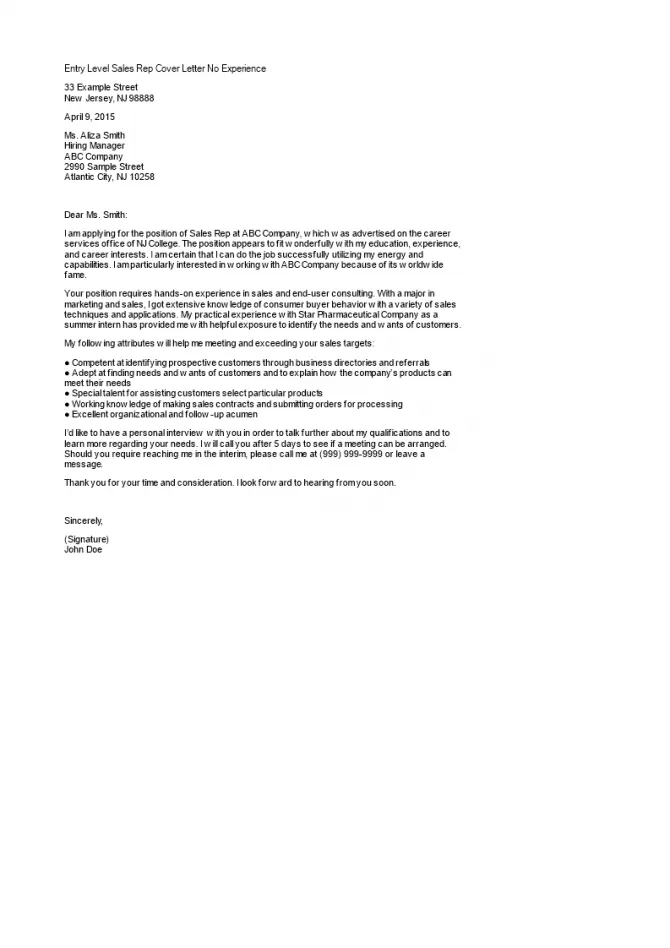
The header section of your cover letter is all about professionalism and clarity. This section provides the essential contact information, ensuring the hiring manager knows how to reach you. It should include your full name, professional email address, phone number, and optionally, your LinkedIn profile URL. It’s also crucial to include the date and the recipient’s contact information, including their name, title, and the company’s address. Using a clean, easy-to-read font and formatting ensures that your header is both informative and visually appealing, setting a positive tone for the rest of your letter.
Contact Information and Date
Begin with your contact information at the top of the page. This typically includes your full name, address, phone number, and professional email address. Following this, insert the date. Ensure the date is accurate and formatted correctly. This date is the day you are submitting your application.
Recipient’s Details
Next, address the recipient by name if possible. Research the company’s website or LinkedIn to find the hiring manager’s or recruiter’s name. If you are unsure, use a general greeting like “Dear Hiring Manager.” Include their title and the company’s mailing address.
The Introduction
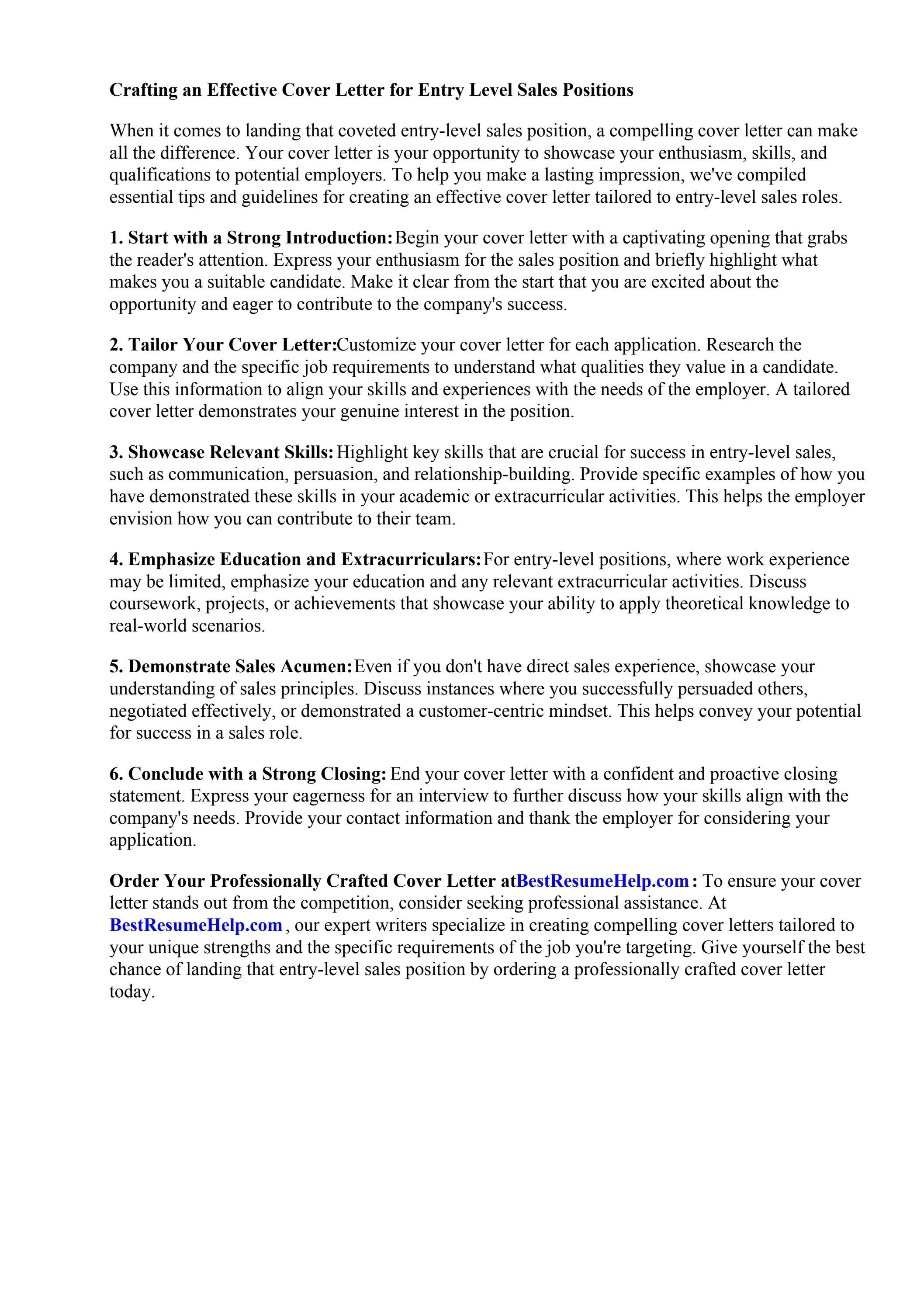
The introduction is your chance to capture the reader’s attention immediately. It should be concise, engaging, and clearly state the position you are applying for. Avoid generic openings and aim to create a memorable first impression. This section should also convey your enthusiasm for the role and the company. The best introductions quickly highlight your key skills or experiences that align with the job requirements. Make the hiring manager want to read further, indicating your unique value proposition.
Grabbing Attention Immediately
Start with a strong hook. This could be a brief statement about your biggest accomplishment, a quote that resonates with your sales philosophy, or a statement about why you are passionate about the company or the role. This initial statement sets the tone and motivates the reader to learn more about you.
Highlighting Your Passion and Enthusiasm for Sales
Express your excitement for the sales industry. Explain why you are drawn to sales and what motivates you. Even with limited experience, highlighting your passion demonstrates your potential and eagerness to learn and succeed. Mention specific aspects of the sales role that excite you, like building relationships, achieving targets, or solving customer problems.
The Body Paragraphs
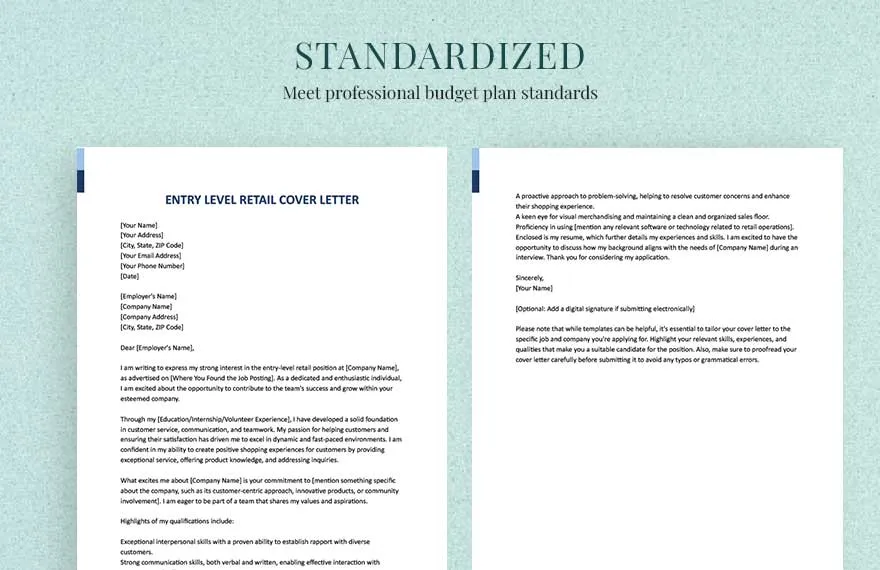
The body paragraphs form the core of your cover letter, providing detailed evidence of your suitability for the entry-level sales position. These paragraphs should highlight your relevant skills, experiences, and achievements. If you have prior sales experience, emphasize it with quantifiable results. If not, focus on transferable skills such as communication, problem-solving, and customer service. Always tailor your content to align with the specific requirements outlined in the job description.
Showcasing Relevant Skills and Experiences
List your sales skills and relevant experience. Mention specific skills, such as communication, persuasion, negotiation, and active listening. Describe experiences that have prepared you for sales, even if they weren’t formally sales roles. Highlight any achievements and the role you played in these experiences to give the recruiter a better sense of your abilities.
Emphasizing Transferable Skills
If you lack direct sales experience, focus on transferable skills such as customer service, communication, problem-solving, and leadership. These skills are highly valuable in sales. Provide examples of how you demonstrated these skills in previous roles, volunteer work, or academic projects. For example, talk about how you successfully resolved a customer issue or led a team to achieve a goal.
Quantifying Achievements and Results (Even Without Direct Sales Experience)
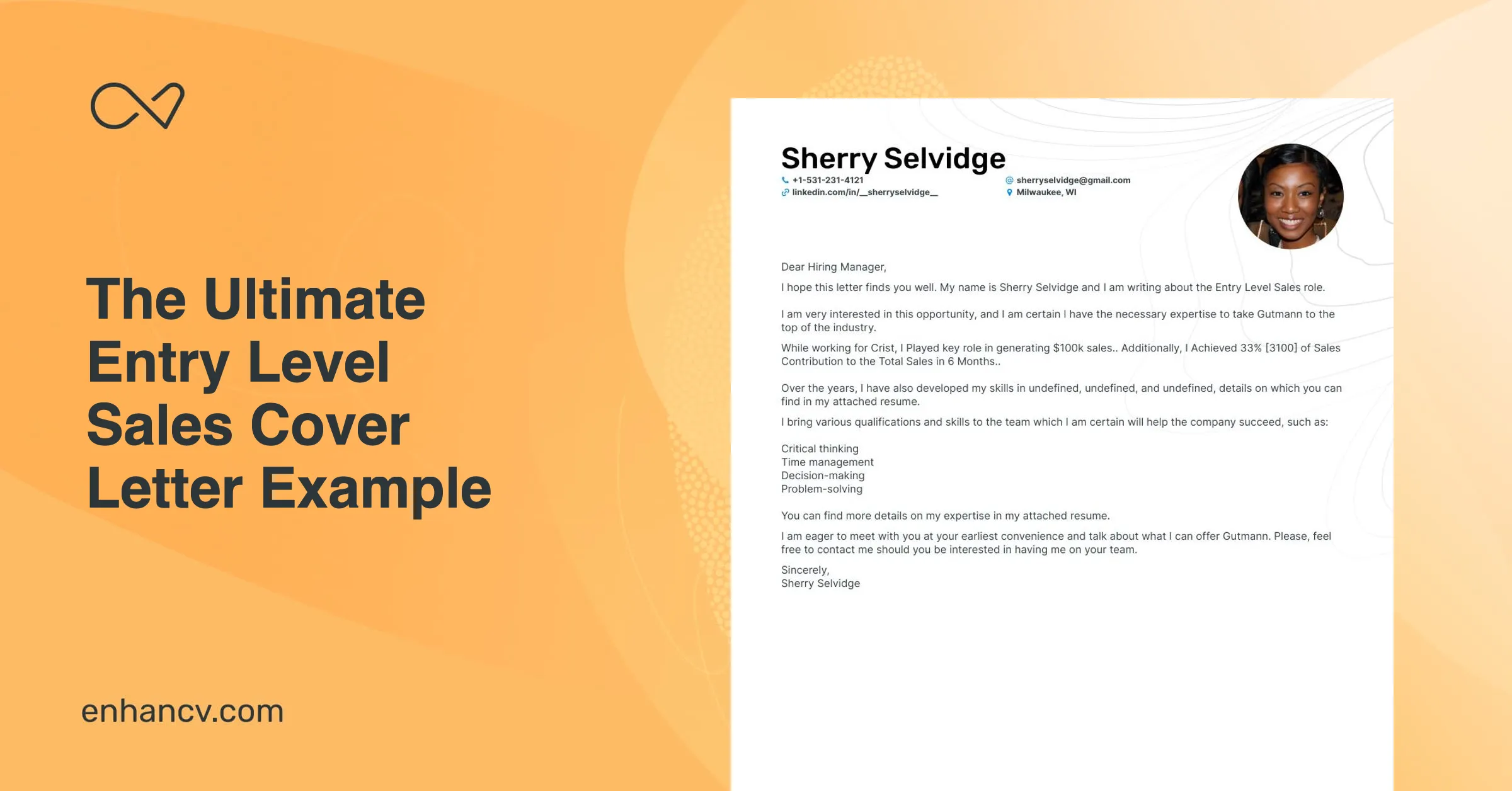
Use data to showcase your accomplishments. Even without direct sales experience, you can quantify your achievements from other experiences. For example, if you improved customer satisfaction, mention the percentage increase. If you were involved in a project that saved time or money, provide specific numbers. These metrics provide solid evidence of your capabilities and potential, making your cover letter more impactful.
Demonstrating Your Understanding of the Company and Role
Show the hiring manager that you understand the company and the specific sales role. Mention what you know about their products, services, target market, and company culture. Explain why you are a good fit for the company and how your skills and values align with theirs. This proves that you have done your homework and are genuinely interested in joining their team.
Researching the Company
Thoroughly research the company before writing your cover letter. Visit their website, read their blog, and explore their social media channels. Understand their mission, values, and recent news. Identify their products or services, target audience, and competitive landscape. This will help you tailor your cover letter and demonstrate your interest in the company.
Tailoring Your Letter to the Job Description
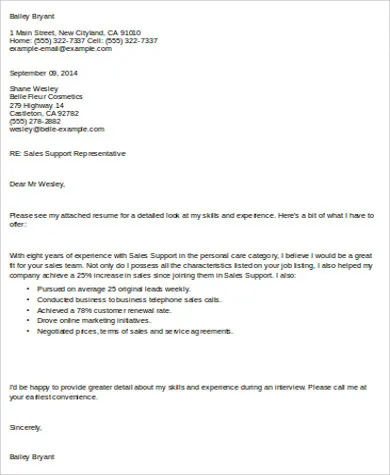
Carefully read the job description and identify the key requirements and desired skills. Customize your cover letter to address each point directly. Use the same keywords from the job description where appropriate. Give examples of how your experience aligns with the job requirements. This will help you show that you understand the role and possess the skills needed to succeed.
The Closing
The closing of your cover letter should leave a lasting impression and encourage the hiring manager to take action. It should reiterate your interest in the position and express your gratitude for their time and consideration. It should also include a clear call to action, making it easy for them to proceed to the next step.
Reiterating Your Interest and Expressing Gratitude
Reiterate your enthusiasm for the entry-level sales role. Reaffirm your interest in the company. Express your gratitude for the time and consideration the hiring manager has given to your application. This reinforces your appreciation and professionalism.
Including a Call to Action
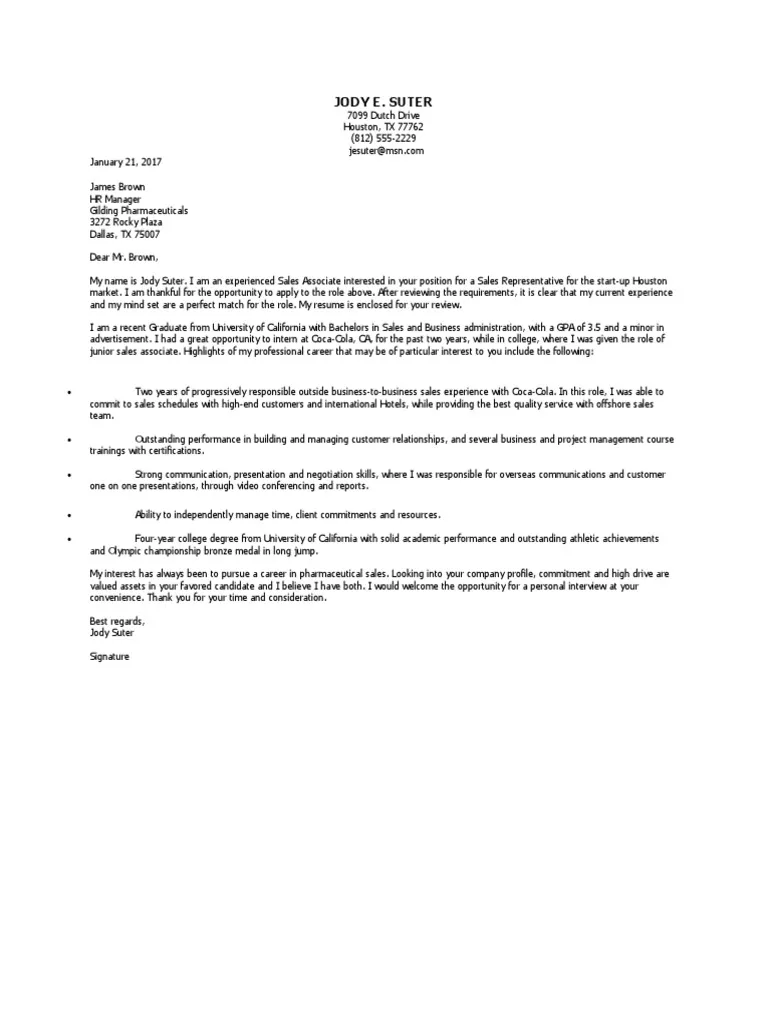
Conclude with a strong call to action, such as requesting an interview. Make it easy for the hiring manager to take the next step. For example, you could state, “I am eager to discuss my qualifications further and welcome the opportunity for an interview.” Provide your contact information one last time to facilitate easy communication.
Proofreading and Formatting Your Cover Letter
Proofreading and formatting are essential steps that can greatly impact the overall impression of your cover letter. Errors in grammar, spelling, and punctuation can undermine your credibility, while poor formatting can make your letter difficult to read. Attention to detail in these areas reflects your professionalism and your commitment to quality.
Tips for Making Your Cover Letter Stand Out
To make your entry-level sales cover letter stand out from the competition, it’s essential to use action verbs, keep it concise and engaging, and format it for readability. These strategies can help you capture the hiring manager’s attention and highlight your key qualifications effectively.
Using Action Verbs
Incorporate strong action verbs throughout your cover letter to describe your accomplishments and skills. Action verbs help to make your statements more dynamic and impactful. Examples include “achieved,” “managed,” “persuaded,” “negotiated,” “collaborated,” and “implemented.” This language demonstrates your initiative, leadership, and ability to achieve results. See image for more examples.
Keeping it Concise and Engaging
Keep your cover letter concise and to the point. Hiring managers often have limited time to review applications, so it’s important to capture their attention quickly. Avoid long paragraphs and complex sentences. Use clear, straightforward language. Focus on the most relevant information. Aim for a letter that is no more than one page in length.
Formatting for Readability
Use a professional, easy-to-read font such as Arial, Calibri, or Times New Roman. Use a font size between 10 and 12 points. Use clear headings, bullet points, and white space to break up text and make it easier to read. Ensure consistent formatting throughout the entire cover letter.
Common Mistakes to Avoid
Avoid common mistakes that can undermine your cover letter’s effectiveness. These include grammatical errors, generic content, and neglecting to tailor your letter to the specific job description. Careful attention to detail and a personalized approach can significantly improve your chances of success.
Sending Your Cover Letter
Once you have finalized your cover letter, ensure you send it correctly. Follow the company’s instructions for submission, whether it’s through an online application portal or via email. This step is as important as crafting the letter itself.
Best Practices for Submission
Carefully review the application instructions provided by the employer. If the instructions specify a particular file format (e.g., PDF, Word document), adhere to them. If submitting via email, use a professional subject line that includes the job title. Attach your cover letter and resume as separate documents, if possible. Double-check all contact information and ensure that the email address is correct before sending.
